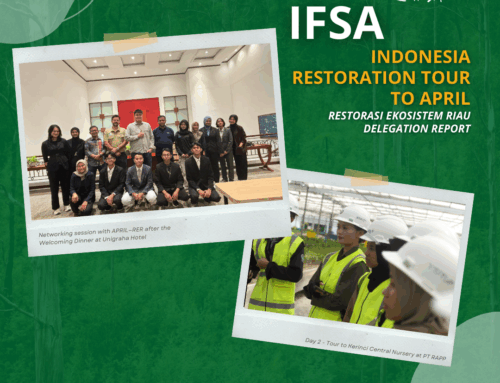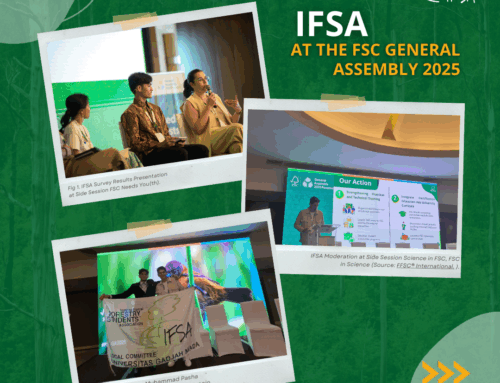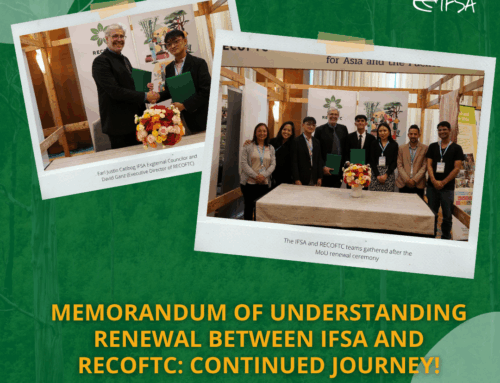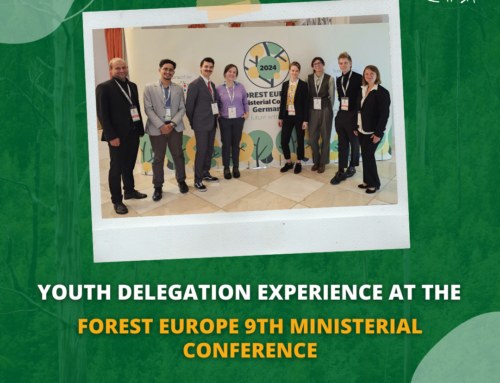The role of the private forest sector in ecosystem restoration
Restoration Scoping Dialogue
- Location: Yale University, New Haven, CT, USA
- Delegates: Claudio Guevara and Sunny Markey (LC OSU)
- Date: January 31 to February 1, 2023
- Organizer: The Forests Dialogue
Summary
The Forests Dialogue (TFD) is a platform and process for multi-stakeholder discussion and collaboration on the most pressing local and global issues facing forests and people. The process consists of three phases:
- First, engaging diverse interests to foster relationships and build trust around contentious forest issues.
- Exploring the issues, challenges, and opportunities ahead.
- Finally, seeking change through consensus-based collaboration aimed at immediate action and long-term progress.
The “Restoration Scoping Dialogue” session is part of the first phase: Engage!
The Restoration initiative of TFD recognizes the potential of the private sector to support the sustainability of forest ecosystem restoration. It focuses on the role of private companies -in collaboration with other stakeholders.
The objectives of the Restoration Scoping Dialogue were to
- Build a collective understanding of stakeholder perspectives and concerns, knowledge and research gaps, and priorities related to the forest sector’s role in ecosystem restoration.
- Identify areas of agreement, disagreement, and fracture lines.
- Contribute to removing barriers and scaling up ecosystem restoration collaboration globally.
- Scope opportunities for dialogue to drive change and foster learnings in specific locations through field dialogues and at global and regional levels.
This event reunited a group of over 30 participants representing academia, NGOs, private companies, UN bodies, investors, and others, to get to know each other and share their perspectives on the forest sector and ecosystem restoration. With guidance from TFD convenors, the group discussed the role of various stakeholders in restoration and potential barriers, challenges, and existing gaps. Then we focused on the private forest sector to identify areas of agreement and disagreement to determine priorities and guide the path forward.


Experience
We started the first day with an overview of the process, making it clear that the spirit of TFD is to create trust and relationships so we can dialogue accordingly. We were invited to be active listeners and to participate as individuals, leaving aside for a moment the organizations we represented. After a session of introductions to learn more about each other’s backgrounds, we had an opening plenary to review the report from the restoration roundtable (held in Rome in October 2022) and the background paper prepared for this session.
A delicious coffee break gave us more time to talk with the people around us and the energy needed to dive straight into the first session: “Perspectives on the forest sector and ecosystem restoration.” During this session, we were divided into four sub-groups to brainstorm about the barriers and challenges of restoration, trying to view these issues from as many points of view as possible. It was great to see that when the group came back together for a plenary reflection, all the sub-groups had identified roughly the same issues, but each had a different perspective to contribute. This was the first insight into how enriching this experience would be!
During the second session, we focused on the private forest sector’s role, experiences, and efforts in ecosystem restoration to narrow down these lists. With a similar sub-group dynamic, we discussed the limitations, expectations, motivations, and opportunities to scale up restoration programs to achieve the goals established by different countries or global initiatives such as the 2021-2030 UN Decade on Ecosystem Restoration. We ended the first day with general reflections and an invitation to participate in a side event by Yale students: “Women in Forestry and Conservation – informal discussion.”


The second day of the Scoping Dialogue started with a summary of our discussions during day one to ensure we had the same understanding and could move forward. We started the third session: “Areas of agreement and disagreement.” This opportunity divided the group into three sub-groups:
- The restoration continuum
- The incentives and demands
- The spheres of control and influence.
These sub-groups aimed to understand better contentious issues (also known as “fracture lines”) to guide the development of strategies to engage with the private forest sector.
Our fourth and last session: “Prioritization and path forward,” consisted of a plenary discussion where we identified a wide array of fracture lines and the potential dialogue opportunities that emerge from them. We emphasized the need to develop a restoration framework that allows for its application to specific contexts based on the needs and interests of each ecosystem and the communities that inhabit them and the need to learn from good examples. This discussion led to a conversation about the potential locations to conduct a field dialogue, where the participants proposed countries such as Brazil, Indonesia, Costa Rica, and Chile (among others).
We ended the event with personal remarks from each participant, where we shared positive thoughts about our experiences participating in the dialogue.
The dialogue Co-Chairs shared a summary of our discussion at the Restoration Panel of the International Society of Tropical Foresters conference.


Communication with Partners
The Forest Dialogue and IFSA have supported youth engagement in important instances such as these dialogue sessions, providing opportunities to collaborate closely and network with global forestry leaders. TFD has been highly supportive, to the extent of sponsoring the travel of one of our IFSA delegates, and has enabled an environment of trust and care that allows for the free expression of thoughts and feelings.
End Note
We are grateful for this great opportunity to engage with various stakeholders and global leaders to discuss important topics such as ecosystem restoration. We shared our concerns about the lack of inclusion of indigenous communities in the dialogue and were informed that some people were invited but could not attend.
We also shared our concerns about some of the proposed solutions that aimed to give more incentives to the private forest sector when what we need is to hold them accountable for their role in ecosystem degradation and fragmentation. Discussions like this inevitably led us to discuss the need to reshape our socioeconomic model if we are serious about achieving our climate change goals. A model based on continuous consumption on a planet with limited resources will never be sustainable. Innumerable generations of youth leaders worldwide have raised this concern and have been regarded as “utopic” by their elders. It is now more important than ever to continue growing these concerns and to invite everyone to think creatively to find the solutions we need. Anything else is doomed to fail. We have the knowledge, resources, technology -and what is more important- the motivation to organize our societies more efficiently and sustainably. Do not let others tell you this is impossible. Let’s do it for our planet and our future generations.
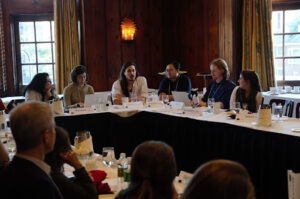
Authors: Claudio Guevara, Sunny Markey

